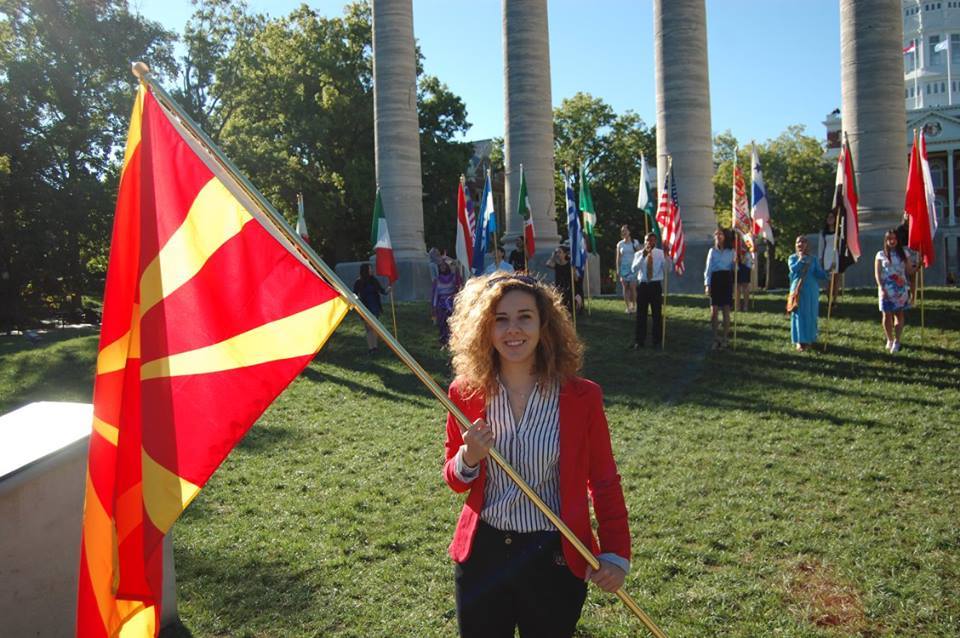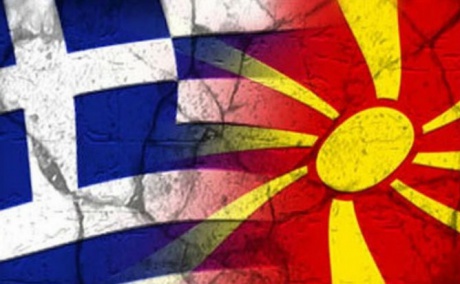“A good compromise is one where everybody makes a contribution.”
– Angela Merkel
In 2011, I got a merit-based scholarship to study in Thessaloniki, Greece for my undergraduate studies. It had been two months since I got back from my exchange program in America, where I shared my Macedonian culture, traditions, history etc. while attending high school. While in the US, I made presentations about my country, dressed in a traditional Macedonian clothing. I also did some volunteering, and my first time being at a Greek Orthodox Church while they had a Greek Festival. I loved helping out and had an amazing time there. They were delighted to have a “neighbor” from Macedonia coming there to help since I was very familiar with the Greek culture and food due to my many tourist visits.
Once I became a student in Greece, I realized I had to change many things. For starters, I deleted a picture of me wearing a T-shirt with the old Macedonian flag from facebook. I did not want to offend the Greeks, as I knew that they regard that symbol as theirs as well. Then, when people would ask me where I am from, I would usually say “from Skopje” – not wanting to cause any trouble. Sometimes, it would slip out, I was used to saying that “I’m from Macedonia” when I was in America – because it was natural to me. Nobody questioned this in the US, people found it interesting and cool – most of them knew nothing about the country anyway. In Greece, I was told not to touch on this issue with students or professors since the name dispute is a touchy subject.

One of the Greek students was very interested in the whole Macedonia-Greece issue, and I was more than happy to discuss it with Giorgos, which is not his real name. When he applied for college in 2011, he was in a dilemma whether or not to accept the offer, even though he was offered a scholarship, in times of a bad economy due to the financial crisis. He felt uneasy because there were “Skopians” in this college. He didn’t want to study with someone like “us”, talk or let alone be friends with someone like us – but he made a rational and logical decision and accepted the offer. I would meet with him occasionally to discuss – he would share the Greek point of view on history, how they see things, and I would do the same from my side – the Macedonian one. Since we were college students we were trying to find reliable sources for our claims. We managed to agree on some things and agreed to disagree on other things. We managed to set the facts straight – facts from history that are correct for both countries.
We agreed that, despite these disagreements and different viewpoints, we have so much in common. We dance similar dances, drink the same coffee, eat the same baklava, having similar traditions. More importantly, we became friends through this process of debating. We respected each other, listened to each other, and learned a lot, broadened our horizons by trying to see through each other’s lenses. We even found history books that have lessons on the Greek, Turkish, Serbian, Macedonian and other nations’ perspectives of the historical periods around the Balkan wars – it was so interesting to go through this and to realize how much we knew only from one side, and that we should look at history from many perspectives. In 2014, Giorgos and I were dancing the traditional Macedonian “oro” together with friends, celebrating the end of our educational journey. I am proud and honored to be a part of the change he went through by being exposed to different cultures and education. We are still friends today, and I call Thessaloniki my second home, as I spent some of my best years there, having so many wonderful memories with my friends as a college student. I am more than certain that there are so many similar stories of friendship and mutual understanding.
It makes me sad to see many Greeks protesting against the name talks. Around 68% of Greeks don’t want the term ‘Macedonia’ to be in the name at all according to a recent poll. They want to protect their ancient identity. Many Macedonians feel that the name is not for sale, and fear the loss of their identity, so they protest as well. Nobody could take away how one feels, and the right to self-determination. An identity cannot be lost with an adjective next to the name of our country, and it cannot be sold or bought either. It can be lost through the massive brain drain happening in Macedonia – so many people flee to find a better future elsewhere. And although they would still feel like Macedonians abroad (even more strongly due to the nostalgia), I doubt that their grandsons or great-grandsons will too, if they stay abroad. I doubt that they will know the Macedonian language, traditions, culture, history etc. as well as they do themselves. An identity can slowly fade away – but it cannot be bought, sold, or determined by another nation. Therefore, the two country’s leaders need to establish a common-ground solution, outlining the history and name issues in order to protect both nation’s identities.
However, this is the first time that our government has made real strides to bring positive changes focusing to solve this dispute. The Macedonian foreign minister visited Greece on many occasions in order to show good neighborly relations and willingness to cooperate. Moreover, the prime minister announced the name change of the airport, as well as the main highway which will be changed from “Alexander the Great” to “Friendship”. I see pictures of thousands of Greeks protesting instead of showing good neighborly relations and willingness of our country to be part of the European family and NATO, although, Alexis Tsipras is ready to cooperate, shown by their lengthy discussions with Zaev in Davos. Macedonia has been a candidate for accession in the EU since 2005, signing the “Stabilisation Agreement” in 2004 – being the first in the Western Balkans that did that. More importantly, the Commission recommended an opening of accession negotiations since 2009, but not one chapter has been opened due to the name dispute. By becoming a part of NATO and the EU, I hope for a more prosperous future of my country, and eventually, even more, vacations to Greece which will add more revenue for Greek tourism. Macedonia is the country that brings the most tourists to Greece, and yet we need to travel with a separate paper and cover a part of our license plates because our passports are not recognized as well as the “MK” abbreviation.
Politicians, as well as the people, should learn how to compromise, discuss, and learn how to broaden their narrow horizons – just like Giorgos and I did, and get over that issue so that we can discuss many others which are way more important and pressing for both our countries: how can we improve our economies? How can we stop the brain drain? Both countries have enormous diasporas around the world, both countries have fragile economies. This is something that should be more important to the people instead of nationalism – employment and prosperity, good economy, and the possibility to pursue happiness.


Sorry to say but this is utterly ignorant write up, what is your claim to expertise – the fact that you were a tourist in Greece
on many occasions? I am sure if your parents could afford it they’ll take you to much nicer places like Croatia or Italy,
but instead they went to Greece because they can drive there with trucks full of peppers and eggs so they don’t spend
any money on food. Greeks don’t dance oro but sirtaki – the oro is danced in Northern Greece, part of which is Thessaloniki,
by the Macedonian minority that is not being recognized and that is at the core of the ‘name dispute’. If they manage to delete the
name Macedonia they manage to delete the culture and the people they never cared to recognize, in a country that is part of EU
and chosen as the cradle of democracy. And this is where the in common things stop, but you probably never went further
south to see how the landscape changes, the food and the culture as well. So save your cliches for the Fulbright committee and please
don’t try to get into Macedonian government – it seems like it is already full of self serving opportunists.
Wow, such hate for nothing
«Giorgos, which is not his real name»: You didn’t need to write this, as “Giorgo/George” is almost as common as “Yanni/John”, in Greece! Hahahahahah!
I like History, as in seeking out the actual events of the Past, okay maybe also with the hidden hope that these events will also verify my own nation’s glory and it’s legacy among the nations, but never straying away from the actual facts. Not what most people have exactly in mind when they assure you that they also love History, but what they really do is building up a collective narrative of illustrious exaggerations, a set of self-inflicted lies lamely designed to boost illusions of national grandeur.
I’m totally convinced that the modern Macedonian nation is Slavic in culture in spite of interacting for centuries with Greeks/Romii, Albanians/Arberites, and Arumanians/Armani, as much as the original holders of the brandname «Macedonians» (the so glorious Greco-Phrygian tribe that took over the Persian Empire), have gone extinct even before Asia Minor’s humbler Phrygians did so. I’m also convinced that «Northern Macedonians» are indeed distinct from Bulgarians (=Bulgars + 7 no-name Slavic nations), but they underwent a name-change because they grew to dislike their own original name. I’ve got an example from Antiquity: When the Lelegian inhabitants of the island of Taphos began understanding Greek, they came to hate their island’s name (taphos=tomb in Greek), so they changed it to Gorgyra/Corcyra/Cercyra/Kέrkyra, from the name of their prime goddess. Similarly, during their earlier days in the Balkans, Dregovichi/Dregovites/Dragovites/Драговитe seeked to get rid of their name which just meant «Swamp People». So they found a far better one, vague, unintelligible, but glorious: «Μακεδονίται/Македонците».
https://kamateros.files.wordpress.com/2018/07/dgahmdqw0aacbgl.jpeg
https://kamateros.files.wordpress.com/2018/07/img_20180708_123217.jpg